7.九年级上U1U2知识点归纳
九上U1T1T2语法笔记
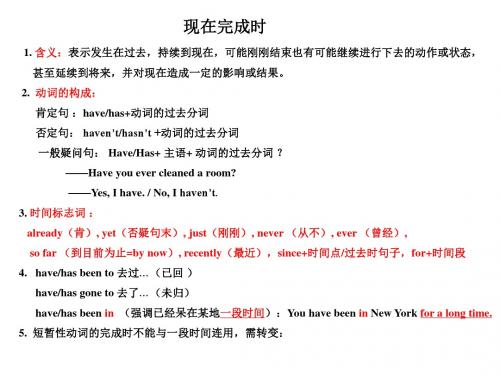
倒装句:肯定句: So+be/情态动词/助动词+主语
(1)--They can swim well. -- So can we.
(2) -- They are students.
(3) -- Alice is a singer.
-- So are we.
-- So is Jack.
否定句: Neither/Nor +be/情态动词/助动词+主语
It’s +形容词+ for sb. to do sth.
13. become worse and worse
14. So far,用于现在完成时
15. take measures to do do sth.
China has taken some many measures to control the population. 16. One is known as the one-child policy. be known as…被…所熟知的
(1) --I don’t like the weather here. -- Neither does she .
(2) -- He can’t play soccer. -- Neither can Tom.
(3) -- They aren’t teachers.
4. increase by…增加了…
现在完成时
1. 含义:表示发生在过去,持续到现在,可能刚刚结束也有可能继续进行下去的动作或状态, 甚至延续到将来,并对现在造成一定的影响或结果。 2. 动词的构成:
肯定句 :have/has+动词的过去分词
否定句: haven’t/hasn’t +动词的过去分词 一般疑问句: Have/Has+ 主语+ 动词的过去分词 ? ——Have you ever cleaned a room?
英语九年级上册m1u2知识点
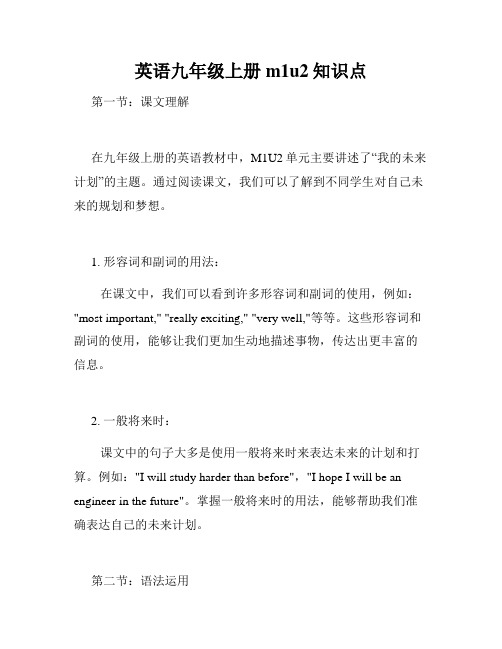
英语九年级上册m1u2知识点第一节:课文理解在九年级上册的英语教材中,M1U2单元主要讲述了“我的未来计划”的主题。
通过阅读课文,我们可以了解到不同学生对自己未来的规划和梦想。
1. 形容词和副词的用法:在课文中,我们可以看到许多形容词和副词的使用,例如:"most important," "really exciting," "very well,"等等。
这些形容词和副词的使用,能够让我们更加生动地描述事物,传达出更丰富的信息。
2. 一般将来时:课文中的句子大多是使用一般将来时来表达未来的计划和打算。
例如:"I will study harder than before","I hope I will be an engineer in the future"。
掌握一般将来时的用法,能够帮助我们准确表达自己的未来计划。
第二节:语法运用1. 条件句:在M1U2单元中,我们学习了条件句的用法。
条件句一般有三种类型:零条件句、一般条件句和虚拟条件句。
在课文中,我们可以看到一些条件句的例子,例如:"If I study hard, I will passthe exam.","If I am in good health, I will be able to achieve my goals." 这些例子展示了不同条件句的使用情景。
2. 定语从句:定语从句是另一个我们在这个单元学到的重要的语法知识点。
在课文中,我们可以找到一些含有定语从句的句子,例如:"The job that pays a lot of money is the best one for me.","The friend who helps me when I need it is a real friend." 学会运用定语从句,能够帮助我们在描述人或物时更加准确。
九年级Unit-1-Topic-2知识点总结

九年级Unit-1-Topic-2知识点总结九年级Unit 1 Topic 2What has happened to the population?一、重点词汇(一)词形转换1. possible --反义词:impossible2. rise --过去分词:rose3. conclude --名词:conclusion4. medicine --形容词:medical5. difficult --名词:difficulty6. less --反义词:more8. different --名词:difference 9. come --过去式:came 、过去分词:come 10. see --过去式:saw 、过去分词:seen 11. peace --形容词:peaceful(二)重点短语1. get lost走失;迷路2.hate to go shopping 讨厌去购物3.hear from sb.=receive/ get a letterfrom sb. 收到某人的来信4.be abroad 在国外5.at least至少6.take place = happen发生7.China’s one-child police中国的独生子女政策8.be strict with sb.对某人要求严格9.the population of China中国的人口10.medical treatment医疗服务11.control the population 控制人口12.be known / famous as以……而闻名13.work well in doing sth在做某事方面很有功效14.have a long way to go有很长的路要走15.be short of 缺乏……16.one of the greatest problems最大的问题之一17.be in trouble 陷入麻烦中/ 在困境中18.offer sb. a good education提供某人良好的教育19.a couple of 一些;几个20.even though = even if 即使21.the differences between A and B A与B之间的区别二、重点语言点1.---- I really hate to go shopping. 我真讨厌去购物。
九年级Unit1-2知识点梳理及高频考点解析
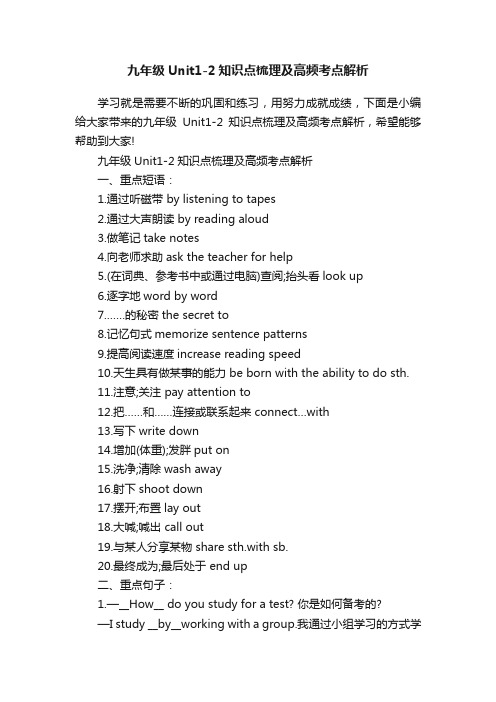
九年级Unit1-2知识点梳理及高频考点解析学习就是需要不断的巩固和练习,用努力成就成绩,下面是小编给大家带来的九年级Unit1-2知识点梳理及高频考点解析,希望能够帮助到大家!九年级Unit1-2知识点梳理及高频考点解析一、重点短语:1.通过听磁带 by listening to tapes2.通过大声朗读 by reading aloud3.做笔记take notes4.向老师求助ask the teacher for help5.(在词典、参考书中或通过电脑)查阅;抬头看look up6.逐字地word by word7.……的秘密the secret to8.记忆句式memorize sentence patterns9.提高阅读速度increase reading speed10.天生具有做某事的能力 be born with the ability to do sth.11.注意;关注 pay attention to12.把……和……连接或联系起来connect…with13.写下write down14.增加(体重);发胖put on15.洗净;清除wash away16.射下shoot down17.摆开;布置lay out18.大喊;喊出 call out19.与某人分享某物 share sth.with sb.20.最终成为;最后处于 end up二、重点句子:1.—__How__ do you study for a test? 你是如何备考的?—I study __by__working with a group.我通过小组学习的方式学习。
2.Don't read __word__by__word__.不要逐字去读。
3.__The__more__ you read,__the__faster__ you'll be.你读得越多,你读得就会越快。
4.But __whether__or__not__ you can do this well__depends__on__ your learning habits.但是你能否做好取决于你的学习习惯。
英语九年级上册一二单元知识点

《英语九年级上册一二单元知识点》一、词汇和短语1. 掌握单元主题相关的词汇和短语,包括描述人的形容词、名词和动词等。
2. 理解并使用常见的学科词汇,如科学、数学、历史等。
3. 学习并掌握与学校生活相关的短语和表达方式。
二、语法知识1. 掌握过去完成时态的使用方法及其相关的句型结构。
2. 学习并掌握宾语从句的用法,特别是与被动语态相关的宾语从句。
3. 学习并理解直接引语和间接引语之间的转换规则。
三、阅读技巧和策略1. 学习并掌握如何快速阅读,理解文章大意和主题思想。
2. 学习并掌握如何识别主题句和支撑句,理解文章结构。
3. 学习并掌握一些阅读技巧,如略读、扫读和预测等。
四、写作技巧和策略1. 学习并掌握如何组织写作结构,使其逻辑清晰、条理分明。
2. 学习并掌握如何使用连接词和短语,使文章流畅自然。
3. 练习写作与单元主题相关的短文,以提高写作能力。
五、口语表达技巧1. 学习并掌握与单元主题相关的日常会话用语。
2. 练习用英语描述学校生活和与人交往的经历,以提高口语表达能力。
3. 参与课堂上的口语活动,积极参与讨论,以提高口语交际能力。
六、文化知识拓展1. 学习并了解单元主题相关的英美文化背景知识。
2. 了解中西方文化差异,以更好地理解和运用英语。
3. 拓展与单元主题相关的文化知识,如学校生活、教育制度等。
总之,九年级上册一二单元是英语学习的重要阶段,需要学生掌握大量的词汇、语法、阅读、写作和口语技巧,同时也要了解相关的文化知识。
通过系统地学习和练习,学生可以更好地掌握英语,提高英语综合能力。
九年级上一二单元知识总结
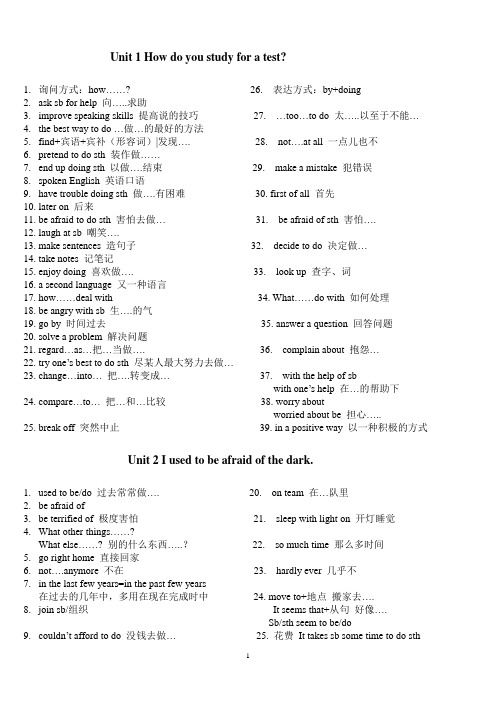
Unit 1 How do you study for a test?1.询问方式:how……? 26. 表达方式:by+doing2.ask sb for help 向…..求助3.improve speaking skills 提高说的技巧27. …too…to do 太…..以至于不能…4.the best way to do …做…的最好的方法5.find+宾语+宾补(形容词)|发现…. 28. not….at all 一点儿也不6.pretend to do sth 装作做……7.end up doing sth 以做….结束29. make a mistake 犯错误8.spoken English 英语口语9.have trouble doing sth 做….有困难30. first of all 首先ter on 后来11.be afraid to do sth 害怕去做…31. be afraid of sth 害怕….ugh at sb 嘲笑….13.make sentences 造句子32. decide to do 决定做…14.take notes 记笔记15.enjoy doing 喜欢做…. 33. look up 查字、词16.a second language 又一种语言17.how……deal with 34. What……do with 如何处理18.be angry with sb 生….的气19.go by 时间过去35. answer a question 回答问题20.solve a problem 解决问题21.regard…as…把…当做…. 36. complain about 抱怨…22.try one’s best to do sth 尽某人最大努力去做…23.change…into…把….转变成…37. with the help of sbwith one’s help 在…的帮助下pare…to…把…和…比较38. worry aboutworried about be 担心…..25.break off 突然中止39. in a positive way 以一种积极的方式Unit 2 I used to be afraid of the dark.ed to be/do 过去常常做…. 20. on team 在…队里2.be afraid of3.be terrified of 极度害怕21. sleep with light on 开灯睡觉4.What other things……?What else……? 别的什么东西…..?22. so much time 那么多时间5.go right home 直接回家6.not….anymore 不在23. hardly ever 几乎不7.in the last few years=in the past few years在过去的几年中,多用在现在完成时中24. move to+地点搬家去….8.join sb/组织It seems that+从句好像….Sb/sth seem to be/do9.couldn’t afford to do 没钱去做…25. 花费It takes sb some time to do sthSb spend time/money on sth(in)doing sthSb pay money for sthSth cost sb money10.as….as possible=as….as sb can/could 尽可能11.be interested in =take an interest in 对…感兴趣26. get into trouble 陷入麻烦中12.make a decision =decide 决定27. cause trouble 惹麻烦13.It is + 形容词+for sb to do sth对于….来说做某事怎么样28. even though =though 虽然引导让步状语从句14.no longer =not…any longer 不在15.take pride in =be proud of 以….为自豪16.pay attention to(介词)+名词/代词/doing 注意….17.feel good about oneself 自我感觉良好18.give up doing 放弃做…. 29.waste one’s time 浪费….的时间19.change one’s mind 改变….的注意。
九年级英语上册各单元知识点归纳

千里之行,始于足下。
九年级英语上册各单元知识点归纳九年级英语上册的各单元知识点归纳如下:Unit 1: Greetings and Introductions- Greetings and responses- Introducing oneself and others- Asking and answering questions about personal information - Talking about likes and dislikesUnit 2: School Life- School subjects and activities- Classroom expressions and commands- Talking about school rules and regulations- Describing school facilities and equipmentUnit 3: Hobbies and Interests- Talking about hobbies and interests- Expressing preferences- Making plans and arrangements- Talking about past activitiesUnit 4: At the Weekend- Talking about weekend activities- Making invitations and accepting or declining invitations - Describing past events using the past simple tenseUnit 5: Food and Drinks第1页/共3页锲而不舍,金石可镂。
- Talking about food and drinks- Describing tastes and preferences- Ordering food and drinks in a restaurant- Talking about cooking and recipesUnit 6: Daily Routines- Talking about daily routines and activities- Using time expressions- Talking about habits using the present simple tense - Describing routines and habits of othersUnit 7: On the Move- Talking about transportation and travel- Asking and giving directions- Talking about different modes of transportation- Discussing travel experiencesUnit 8: At the Restaurant- Ordering food and drinks in a restaurant- Talking about restaurant etiquette- Making complaints and apologizing- Talking about restaurant menus and food preferencesUnit 9: Health and Fitness- Talking about health problems and symptoms- Giving and receiving advice- Describing healthy and unhealthy lifestyles- Talking about exercise and fitnessUnit 10: The World of Work千里之行,始于足下。
仁爱英语九年级上册Unit1-topic2知识点总结
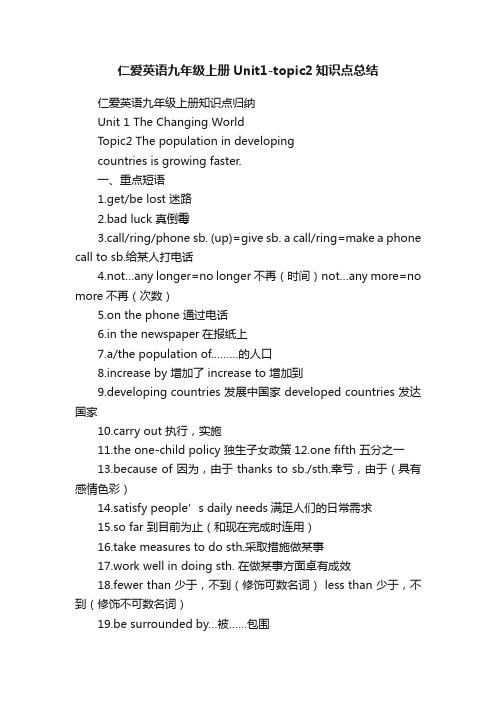
仁爱英语九年级上册Unit1-topic2知识点总结仁爱英语九年级上册知识点归纳Unit 1 The Changing WorldTopic2 The population in developingcountries is growing faster.一、重点短语1.get/be lost 迷路2.bad luck 真倒霉3.call/ring/phone sb. (up)=give sb. a call/ring=make a phone call to sb.给某人打电话4.not…any longer=no longer不再(时间)not…any more=no more不再(次数)5.on the phone 通过电话6.in the newspaper在报纸上7.a/the population of………的人口8.increase by 增加了 increase to 增加到9.developing countries 发展中国家 developed countries 发达国家10.carry out 执行,实施11.the one-child policy 独生子女政策12.one fifth 五分之一13.because of 因为,由于 thanks to sb./sth.幸亏,由于(具有感情色彩)14.satisfy people’s daily needs满足人们的日常需求15.so far 到目前为止(和现在完成时连用)16.take measures to do sth.采取措施做某事17.work well in doing sth. 在做某事方面卓有成效18.fewer than 少于,不到(修饰可数名词) less than 少于,不到(修饰不可数名词)19.be surrounded by…被……包围20.close to…接近于/在……附近21.discourage doing sth. 阻止做某事22.first of all 首先23.belong to 属于24.offer sb.sth.=offer sth. to sb.给某人提供某物二、单词转换1.luck n.幸运 lucky adj. 幸运的 luckily adv. 幸运地2.Russian. 俄罗斯 Russian n. 俄国人,俄语 adj.俄国的,俄国人的,俄语的3.social adj.社会的,社交的 society n.社会4.nature n.自然 natural adj. 自然的5.develop v. 发展 developed adj. 发达的developing adj. 发展中的 development n. 发展三、重点句型1.I have just called you.我刚刚给你打过电话。
九年级unit1 2知识点归纳

九年级unit1 2知识点归纳九年级Unit 1-2知识点归纳九年级的课程中,Unit 1-2是学习英语的基础单元,主要涉及到一些基本的语法知识和词汇积累。
通过学习这些知识点,我们可以更好地理解和运用英语,提高我们的语言能力。
本文将对Unit 1-2的知识点进行归纳和概述。
一、基本语法知识1. 一般现在时:表示经常或习惯性的动作,结构为主语 + 动词原形,例如:I play basketball every day.2. 现在进行时:表示正在进行的动作,结构为主语 + be 动词 + 动词-ing 形式,例如:She is watching TV.3. 一般过去时:表示过去发生的动作或状态,结构为主语 + 动词过去式,例如:He studied English yesterday.4. 一般将来时:表示将要发生的动作,结构为主语 + will + 动词原形,例如:We will visit Beijing next month.5. 宾语从句:用来说明动作的对象或者补充说明主语,常用的引导词有 that, whether, if 等,例如:She said that she was busy.二、词汇积累1. 颜色:red, blue, green, yellow, black, white, purple等。
2. 家庭关系:father, mother, brother, sister, son, daughter等。
3. 人称代词:I, you, he, she, it, we, they等。
4. 数字:1-10的基本数字,以及teen, twenty, thirty, hundred等的读法。
5. 时间状语:today, yesterday, tomorrow, now, often, always, sometimes等。
三、日常用语1. 问候语:Hello, Hi, How are you?等。
九年级上册m2u1重点知识点

九年级上册m2u1重点知识点人生中,我们将会学到很多不同的知识,其中就包括了我们在九年级上学期数学课程中要学习的重点知识点。
本文将会探讨这些知识点,从代数到几何,从方程到概率,帮助我们更好地理解和掌握数学。
1. 代数:代数是数学中的重要分支,九年级上册我们将会学习一些基本的代数概念和技巧。
例如,我们将会学习如何求解一元一次方程,掌握如何使用因子定理来分解多项式,以及如何应用分式来解决实际问题等。
这些知识点都是构建代数思维和问题解决能力的基础,对我们将来的学业和生活都至关重要。
2. 函数:函数是数学中的一种重要概念,也是九年级上册的重点之一。
我们将学习如何描述和表示各种不同类型的函数,例如线性函数、二次函数、指数函数和对数函数等。
我们还将学习如何分析函数的性质,如零点、极值和图像的特征等。
对于理解实际问题并进行建模,函数的概念和技巧将发挥重要作用。
3. 图形的性质与变换:几何是数学中一个有趣且具有挑战性的领域。
在九年级上学期,我们将探究图形的性质与变换。
我们将学习如何分类图形,并掌握它们的特征和性质。
同时,我们还将学习如何进行图形的平移、旋转和反射变换,以及如何使用这些变换来解决实际问题。
几何的学习将培养我们的空间想象力和逻辑推理能力。
4. 概率与统计:在我们的日常生活中,概率和统计扮演着重要的角色。
九年级上册,我们将学习如何计算概率,并应用概率来解决一些实际问题。
我们还将学习如何收集、整理和分析数据,以了解数据的分布和趋势,从而做出合理的推断。
概率和统计的学习将帮助我们在面对不确定性和复杂情境时做出明智的决策。
通过学习九年级上册数学课程的重点知识点,我们可以培养和发展一系列重要的数学技能和思维能力,如逻辑推理、问题解决、空间想象和数据分析等。
同时,数学的学习还将促使我们培养坚持不懈的精神和批判性思维,这些品质在我们的未来学业和职业发展中也将起到至关重要的作用。
无论我们将来是选择走数学专业的路,还是将数学知识应用于其他领域,掌握九年级上册数学课程的重点知识点都是非常有价值的。
仁爱版英语九年级上册Unti1---Unit2 考点复习总结

仁爱版英语九年级上册考点(unit 1-unit 2)【教材回归 考点过关】1.have/has been to 表“曾经去过某地”(去而复返)区别:have/has gone to 表“已经去某地了”如: I have been to Shanghai.(去过上海,已经回来)He has gone to Shanghai.(去上海了,不在此处)2.have (no) time to do sth 做某事(没)有时间Tom is busy helping his mother with housework, he has no time to play with you. 汤姆忙于帮助妈妈做家务,他没有时间和你玩3.What’s the population of...? 对人口提问=How large is the population of ...What’s the population of China? 中国的人口是多少?How large is the population of China?注:人口不能用many/much 修饰,但是how many people 对多少人提问这样是可以的。
How many people are there in China?=What’s the population of China? 4.What do you mean by sth.?某物是什么意思呢?= What’s the meaning of sth.? = What does sth.mean?如:What do you mean by the word? 这个单词是什么意思?= What’s the meaning of the word?= What does the word mean?5.----How long have you been like this? 你处于这样的状态多久了?---- I have been like this since last month.自从上个月以来我一直这样。
(全)人教九年级上册英语Unit1-2单元知识点考点总结梳理
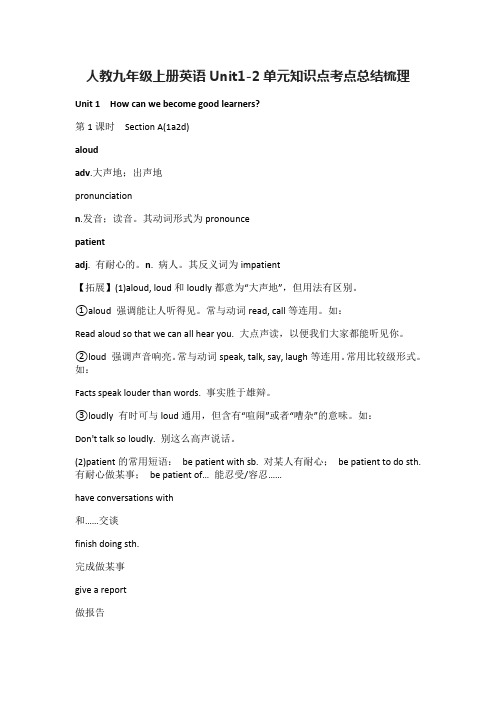
人教九年级上册英语Unit1-2单元知识点考点总结梳理Unit 1How can we become good learners?第1课时Section A(1a2d)aloudadv.大声地;出声地pronunciationn.发音;读音。
其动词形式为pronouncepatientadj. 有耐心的。
n. 病人。
其反义词为impatient【拓展】(1)aloud, loud和loudly都意为“大声地”,但用法有区别。
①aloud 强调能让人听得见。
常与动词read, call等连用。
如:Read aloud so that we can all hear you. 大点声读,以便我们大家都能听见你。
②loud 强调声音响亮。
常与动词speak, talk, say, laugh等连用。
常用比较级形式。
如:Facts speak louder than words. 事实胜于雄辩。
③loudly 有时可与loud通用,但含有“喧闹”或者“嘈杂”的意味。
如:Don't talk so loudly. 别这么高声说话。
(2)patient的常用短语:be patient with sb. 对某人有耐心;be patient to do sth. 有耐心做某事;be patient of… 能忍受/容忍……have conversations with和……交谈finish doing sth.完成做某事give a report做报告word by word逐字/词地☆It's too hard to understand spoken English.理解英语口语太难了。
“It is+adj.+to do sth.”结构,it在句中作形式主语,真正的主语是动词不定式的内容。
如:He speaks in a low voice. It's too hard to hear him clearly. 他说话声音很低,太难听清楚他说什么了。
七年级英语u1到u2的知识点
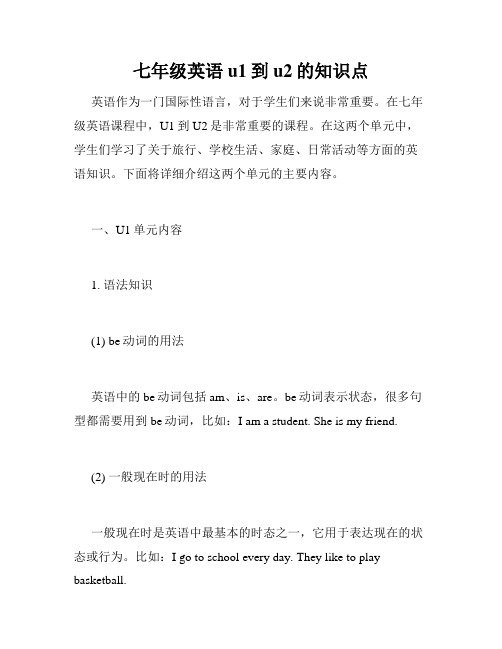
七年级英语u1到u2的知识点英语作为一门国际性语言,对于学生们来说非常重要。
在七年级英语课程中,U1到U2是非常重要的课程。
在这两个单元中,学生们学习了关于旅行、学校生活、家庭、日常活动等方面的英语知识。
下面将详细介绍这两个单元的主要内容。
一、U1单元内容1. 语法知识(1) be动词的用法英语中的be动词包括am、is、are。
be动词表示状态,很多句型都需要用到be动词,比如:I am a student. She is my friend.(2) 一般现在时的用法一般现在时是英语中最基本的时态之一,它用于表达现在的状态或行为。
比如:I go to school every day. They like to play basketball.(3) there be 句型there be 句型通常用于描述某个地方存在什么物品或者人。
比如:There is a pen on the desk. There are some books on the shelf.2. 生活知识(1) 旅行学生们在U1单元中学习了关于旅行的英语知识,包括询问路线、购买车票和在旅游景点中的日常互动等。
(2) 学校生活学生们也学习了关于学校生活的英语知识,包括日常活动、学校设施、课程表等。
二、U2单元内容1. 语法知识(1) 一般过去时的用法学生们在U2单元中学习了关于一般过去时的用法,包括规则动词的过去式、不规则动词的过去式等。
(2) can和can't的用法can和can't用于表示某个人是否具有某项能力。
比如:I can swim. She can't speak Chinese.(3) 疑问词的使用在U2单元中,学生们还学习了关于疑问词的用法,包括what、where、when等。
2. 生活知识(1) 家庭学生们在U2单元中学习了关于家庭的英语知识,包括家庭成员、房间内部和外部的描述等。
九年级U1U2英语仁爱版知识点
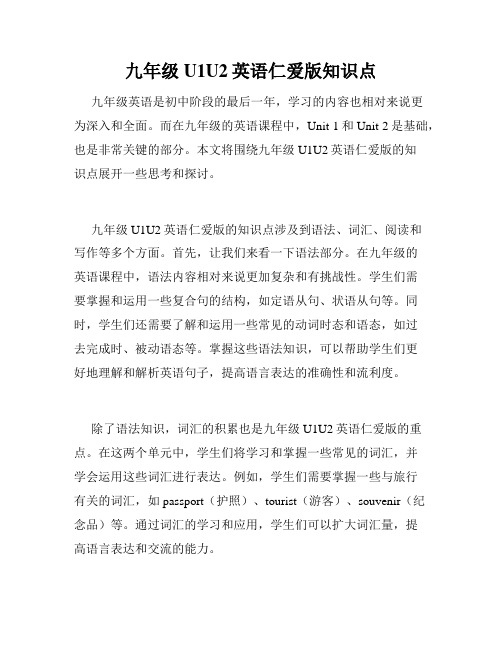
九年级U1U2英语仁爱版知识点九年级英语是初中阶段的最后一年,学习的内容也相对来说更为深入和全面。
而在九年级的英语课程中,Unit 1和Unit 2是基础,也是非常关键的部分。
本文将围绕九年级U1U2英语仁爱版的知识点展开一些思考和探讨。
九年级U1U2英语仁爱版的知识点涉及到语法、词汇、阅读和写作等多个方面。
首先,让我们来看一下语法部分。
在九年级的英语课程中,语法内容相对来说更加复杂和有挑战性。
学生们需要掌握和运用一些复合句的结构,如定语从句、状语从句等。
同时,学生们还需要了解和运用一些常见的动词时态和语态,如过去完成时、被动语态等。
掌握这些语法知识,可以帮助学生们更好地理解和解析英语句子,提高语言表达的准确性和流利度。
除了语法知识,词汇的积累也是九年级U1U2英语仁爱版的重点。
在这两个单元中,学生们将学习和掌握一些常见的词汇,并学会运用这些词汇进行表达。
例如,学生们需要掌握一些与旅行有关的词汇,如passport(护照)、tourist(游客)、souvenir(纪念品)等。
通过词汇的学习和应用,学生们可以扩大词汇量,提高语言表达和交流的能力。
在九年级U1U2英语仁爱版中,阅读理解也是一个重要的环节。
通过阅读不同类型的文章,学生们可以提高阅读理解能力和阅读速度。
同时,通过阅读可以帮助学生们了解不同的文化和思维方式。
在阅读理解的过程中,学生们不仅需要理解文章的主旨和细节,还需要掌握一些阅读技巧,如快速阅读、Skimming(略读)和Scanning(查读)等。
这些技巧能够帮助学生们提高阅读效率和准确性。
最后,九年级U1U2英语仁爱版也注重培养学生们的写作能力。
学生们需要学会写一些日常交流和旅行经历的短文,表达自己的观点和感受。
在写作过程中,学生们不仅需要运用正确的语法结构和词汇,还需要培养自己的逻辑思维和组织能力。
通过写作,学生们能够更好地展示自己的观点和思维,提高语言表达的准确性和流畅度。
综上所述,九年级U1U2英语仁爱版的知识点涉及到语法、词汇、阅读和写作等多个方面。
九年级上册英语每个单元的知识点总结
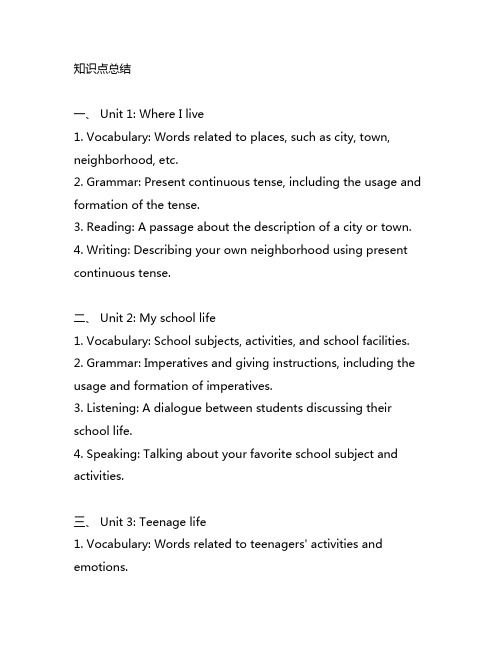
知识点总结一、 Unit 1: Where I live1. Vocabulary: Words related to places, such as city, town, neighborhood, etc.2. Grammar: Present continuous tense, including the usage and formation of the tense.3. Reading: A passage about the description of a city or town.4. Writing: Describing your own neighborhood using present continuous tense.二、 Unit 2: My school life1. Vocabulary: School subjects, activities, and school facilities.2. Grammar: Imperatives and giving instructions, including the usage and formation of imperatives.3. Listening: A dialogue between students discussing their school life.4. Speaking: Talking about your favorite school subject and activities.三、 Unit 3: Teenage life1. Vocabulary: Words related to teenagers' activities and emotions.2. Grammar: Comparatives and superlatives, including the usage and formation of the two forms.3. Reading: A passage about the differences between teenagers in different countries.4. Writing: Comparing your life with the life of a teenager in another country.四、 Unit 4: Our world1. Vocabulary: Words related to environment, natural disasters, and climate change.2. Grammar: Present simple tense and adverbs of frequency, including the usage and formation of the two forms.3. Listening: A news report about global warming and its effects.4. Speaking: Discussing ways to protect the environment.五、 Unit 5: Free time1. Vocabulary: Words related to hobbies, leisure activities, and entert本人nment.2. Grammar: Past simple tense, including the usage and formation of the tense.3. Reading: A passage about the benefits of leisure activities.4. Writing: Describing your favorite hobby and how you started doing it.六、 Unit 6: Around the world1. Vocabulary: Words related to travel, countries, and cultures.2. Grammar: Future tense and going to form, including the usage and formation of the two forms.3. Listening: A travel podcast about different countries and their attractions.4. Speaking: Discussing your dream travel destinations and why you want to visit them.七、 Unit 7: Health and fitness1. Vocabulary: Words related to health, exercise, and healthy lifestyle.2. Grammar: Modals for obligation and advice, including the usage and formation of the modals.3. Reading: A passage about the importance of a balanced diet and regular exercise.4. Writing: Giving advice to someone on how to live a healthy lifestyle.八、 Unit 8: Natural wonders1. Vocabulary: Words related to natural wonders, landmarks, and geographical features.2. Grammar: Passive voice, including the usage and formation of the passive form.3. Listening: A documentary about the wonders of the world.4. Speaking: Discussing your favorite natural wonder and why it fascinates you.九、 Unit 9: Communication1. Vocabulary: Words related tomunication, technology, and social media.2. Grammar: Reported speech, including the usage and formation of reported statements and questions.3. Reading: A passage about the impact of social media onmunication.4. Writing: Discussing the advantages and disadvantages of using social media formunication.以上是九年级上册英语每个单元的知识点总结,希望能帮助同学们更好地复习和掌握课程内容。
九年级上册英语u2t1知识点
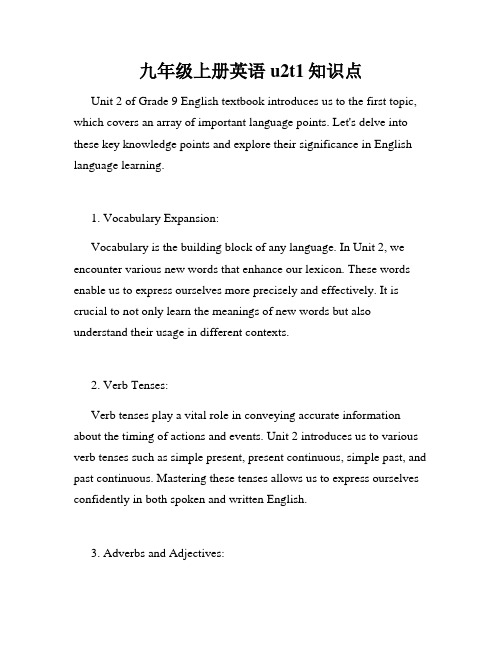
九年级上册英语u2t1知识点Unit 2 of Grade 9 English textbook introduces us to the first topic, which covers an array of important language points. Let's delve into these key knowledge points and explore their significance in English language learning.1. Vocabulary Expansion:Vocabulary is the building block of any language. In Unit 2, we encounter various new words that enhance our lexicon. These words enable us to express ourselves more precisely and effectively. It is crucial to not only learn the meanings of new words but also understand their usage in different contexts.2. Verb Tenses:Verb tenses play a vital role in conveying accurate information about the timing of actions and events. Unit 2 introduces us to various verb tenses such as simple present, present continuous, simple past, and past continuous. Mastering these tenses allows us to express ourselves confidently in both spoken and written English.3. Adverbs and Adjectives:Adverbs and adjectives are essential in adding depth and detail to our language. Properly incorporating these modifiers into our sentences creates vivid imagery and helps convey precise meanings. Unit 2 teaches us about comparative and superlative forms of adverbs and adjectives, enabling us to describe things more effectively.4. Direct and Indirect Speech:The ability to accurately report what someone else has said is an important aspect of communication. Unit 2 covers direct and indirect speech, also known as reported speech. By learning this aspect of grammar, we can confidently report conversations or information we have heard, making us effective communicators in English.5. Conditional Sentences:Conditional sentences are used to express possibilities, hypothetical situations, or cause and effect relationships. Unit 2 introduces three types of conditional sentences: zero conditional, first conditional, and second conditional. Familiarizing ourselves with these sentence structures enhances our ability to express our thoughts and opinions clearly.6. Prepositional Phrases:Prepositions are small words that indicate relationships between different parts of a sentence. Unit 2 familiarizes us with prepositions and prepositional phrases, enabling us to express location, time, direction, or manner more accurately.7. Modal Verbs:Unit 2 introduces modal verbs, which express ability, possibility, permission, necessity, and other concepts. Modal verbs include words such as can, could, may, might, must, shall, should, will, and would. Understanding and correctly utilizing modal verbs allows us to convey our intentions and attitudes appropriately in various situations.8. Word Formation:In Unit 2, we learn about word formation, which involves creating new words by adding prefixes, suffixes, or changing word forms. This knowledge helps us expand our vocabulary and comprehend the meaning of unfamiliar words encountered in reading or conversation.9. Reading Comprehension Strategies:Unit 2 focuses on improving our reading comprehension skills. It introduces strategies such as skimming, scanning, predicting, and summarizing. These strategies equip us to comprehend texts moreefficiently and effectively, enabling us to gain valuable information from various written materials.Unit 2 of Grade 9 English is packed with important knowledge points that serve as a foundation for further language acquisition. By mastering these concepts, we enhance our speaking, writing, reading, and listening skills, enabling us to become effective English language users.。
七年级上册英语U1U2知识点
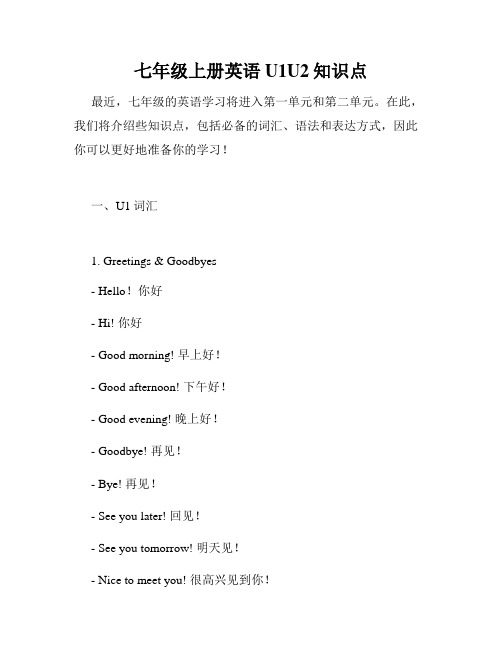
七年级上册英语U1U2知识点最近,七年级的英语学习将进入第一单元和第二单元。
在此,我们将介绍些知识点,包括必备的词汇、语法和表达方式,因此你可以更好地准备你的学习!一、U1词汇1. Greetings & Goodbyes- Hello!你好- Hi! 你好- Good morning! 早上好!- Good afternoon! 下午好!- Good evening! 晚上好!- Goodbye! 再见!- Bye! 再见!- See you later! 回见!- See you tomorrow! 明天见!- Nice to meet you! 很高兴见到你!2. Classroom Language- What’s this in English? 这个用英语怎么说?- How do you spell it? 你怎么拼写它?- Can I borrow a pencil/pen? 我能借个铅笔/钢笔吗?- May I go to the restroom, please? 我可以去洗手间吗?- Excuse me! 对不起,打扰一下!- I’m sor ry. 抱歉。
- Thank you! 谢谢!- You’re welcome! 不用谢!二、U1语法1. Be动词(am, is, are)- am用于第一人称单数,如: I am 英语老师。
- is用于第三人称单数,如: She is 13 years old.- are用于第二人称单数和复数/第一人称复数/第三人称复数,如: You are very smart.2. There be句型There be句型用来描述某些地方或场景中存在的物品或人员。
如: There is a computer in the classroom.(教室里有一台电脑。
)三、U2词汇1. Family Members- father/dad: 爸爸- mother/mom: 妈妈- brother: 哥哥/弟弟- sister: 姐姐/妹妹- grandparents: 祖父母/外祖父母- uncle: 叔父/舅舅2. Plural Nouns- 单数变复数的规则通常是在单词末尾加-s,如: book-books.3. Adjectives形容词通常用于描述名词或代词,如:a big house, a beautiful girl.四、U2语法1. 人称代词- I/me: 我;- you: 你/你们;- he/him: 他;- she/her: 她;- it: 它;- we/us: 我们;- they/them: 他们。
九年级上册u1t2知识点总结
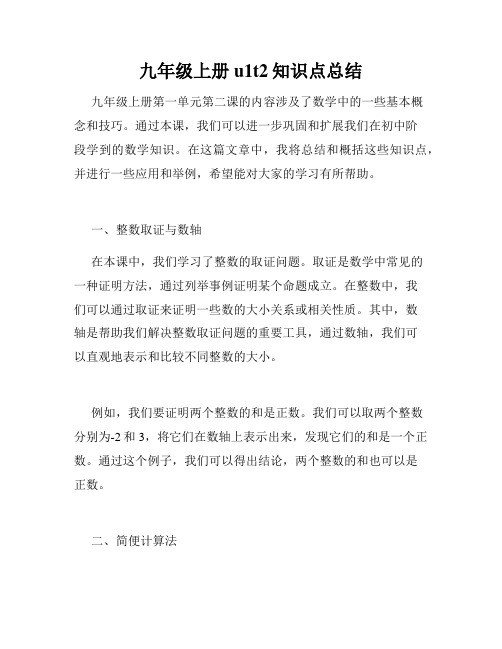
九年级上册u1t2知识点总结九年级上册第一单元第二课的内容涉及了数学中的一些基本概念和技巧。
通过本课,我们可以进一步巩固和扩展我们在初中阶段学到的数学知识。
在这篇文章中,我将总结和概括这些知识点,并进行一些应用和举例,希望能对大家的学习有所帮助。
一、整数取证与数轴在本课中,我们学习了整数的取证问题。
取证是数学中常见的一种证明方法,通过列举事例证明某个命题成立。
在整数中,我们可以通过取证来证明一些数的大小关系或相关性质。
其中,数轴是帮助我们解决整数取证问题的重要工具,通过数轴,我们可以直观地表示和比较不同整数的大小。
例如,我们要证明两个整数的和是正数。
我们可以取两个整数分别为-2和3,将它们在数轴上表示出来,发现它们的和是一个正数。
通过这个例子,我们可以得出结论,两个整数的和也可以是正数。
二、简便计算法在本课中,我们学习了一些简便计算法。
这些方法可以帮助我们更快地完成一些基本的运算,提高计算的效率。
1.乘法:当我们计算两个个位数相乘时,可以利用历乘法表中的规律,将其中一个数通过个位数逐位相乘法与另一个数相乘。
这样,我们可以利用简单乘法的方式,得出两个个位数相乘的结果。
2.凑整运算:当我们需要做近似估算时,可以利用凑整运算。
例如,我们要计算37.4 + 21.7,可以先将两个数凑整为40和20,然后计算40 + 20 = 60。
虽然这个结果并不精确,但可以帮助我们快速预估复杂运算的结果。
三、整式的定义与运算整式是由常数和变量的积或两个或两个以上的单项式相加或相减构成的代数式。
在本课中,我们学习了整式的定义和运算规则。
例如,我们有以下两个整式:2xy - 3x + 54xy + 2x - 7y我们可以进行整式的加法:(2xy - 3x + 5) + (4xy + 2x - 7y)合并同类项后,得到:6xy - x - 7y + 5同样,我们也可以进行整式的减法:(2xy - 3x + 5) - (4xy + 2x - 7y)合并同类项后,得到:-2xy -5x + 7y + 5四、二次根式的化简我们学习了如何化简二次根式,即将二次根式表示为一个系数与根号的形式。
- 1、下载文档前请自行甄别文档内容的完整性,平台不提供额外的编辑、内容补充、找答案等附加服务。
- 2、"仅部分预览"的文档,不可在线预览部分如存在完整性等问题,可反馈申请退款(可完整预览的文档不适用该条件!)。
- 3、如文档侵犯您的权益,请联系客服反馈,我们会尽快为您处理(人工客服工作时间:9:00-18:30)。
九年级Unit 1 Topic 1一语法现在完成时1.基本概念:用来表示在说话之前已经发生或已经完成的动作或状态,其结果的影响现在还存在;也可表示持续到现在的动作或状态。
2.基本结构:助动词have/has+动词的过去分词(单三用has)3.基本句式:(1)肯定句:主语+have/has+过去分词·······eg:My uncle has worked in Beijing for more than twenty years.(2)否定句:主语+has/have+not+过去分词······eg:I haven’t heard from him. 我没有收到过他的来信。
She hasn’t seen the film.她没有看过那个电影。
(3)一般疑问句Have/Has+主语+过去分词······?Yes.主语+have/has. No,主语+ have/has.eg:Have you found him yet?Yes,I have.Has Peter cooked at home?No,he hasn’t.(4)特殊疑问句:特殊疑问词+have/has+主语+过去分词·····?Eg:How many timve you been to Beijing?What has he seen ?他都看见什么了?4.基本用法:(1)现在完成时所表示的动作都是发生于过去的某一时间。
而“现在”是其表达的基准或扩展。
故他表示过去发生或已经完成的某一动作对现在产生的影响或结果,通常不与时间状语联用。
常与just,before,already,yet,not···yet,never,ever,recently等不明确指出时间的状语连用。
eg:He has alreaday gone home.他已经回家了。
Kangkang has just turned off the light.康康刚把灯关上。
Have you ever been to Shanghai ?(2)现在完成时不能和明确表示过去时间的状语连用。
如:yesterday,last week,in 1999,two days ago,just before.(3)现在完成时也可以和包括现在在内的时间状语连用。
如:this week,this morning ,today,this year.等They have mored three times this year.(4)现在完成时表示从过去某一时刻延续到现在的动作或状态,常与for ,since引导的状语连用。
for+一段时间since+过去某时间点或从句(从句的谓语动词用过去式)I have lived here for twenty years.我住在这里已经有20年了。
He has always helped me with my English since he came here.(5)have/has been to与have/has gone to 的区别(后地点是副词,不能加to have/has gone home/here/there)①have/has been to +某地表示某人的一种经历到过某地(去过某地,但说话时已经回来了)可以和once (一次曾经)twice(两次)often(经常)never(从不)ever(曾经)等连用eg He has been to Beijing fourtimes.他去过北京四次了。
Have you just been there? 你刚在那里吗?②have/has gone to +某地表示某人去某地了(说话时某人已经离开说话地点,在去某地的路途上或已在某地)所以一般来说此句型只用于第三人称,并且此句型不能与once twice ofen never ever 等连用。
eg :His mother has gone to Shanghai.她母亲去上海了。
She has gone to see her friend in the hospital.她去医院看她的朋友了。
Section A一.一.知识点1 ①so···that···如此···以至于···引导结果状语从句Eg He ran so quickly that we couldn’tkeep up with him.He is so young that he can’t go to school =He is too young to go to school.So+形容词/副词+that从句So+形容词+a/an+单数可数名词+that从句He is so clever a boy that everyone likes him.=He is such a clever boy that everyone likes him.②such a/an +形容词+单数可数名词+that从句Such +_形容词+复数可数名词/不可数名词+that从句eg: It was such terrible weather that we had to stay at home all day.③so that “以便为了”I worked very hard so that I could pass the exams.④当that 前的名词有表示数量的many much little few 修饰时,句子必须用so eg :I have so much work to do that I can’t go to the concert.There is so little time left that we must hurry.22There goes the bell.铃响了。
此举是倒装语序,倒装分局不倒装和完全倒装。
当主语是代词时,用局部倒装:Here he comes! Here you are! Here it is!当主语是名词时,用完全倒装:There comes the bus!33记住以下句子和词组:①很高兴做某事be happy to do something =be glad to do something =be pleased to do something②度过一个愉快的假期have s good summer holiday③从家乡返回come back from your hometown ④发生take place⑤变得越来越美become more and more beautiful ⑥找一个合适的地方照相Find a prope place to take photos. ⑦将回来will be back =will come back ⑧你去了什么地方where have you been?我去了北京I have been to Beijing.⑨她去了什么地方?She has gone to Cuba. ⑩随便问一下by the way 11去···的路on one’s way to 加地点12 你去了医院吗?Have you been to the hospital 是的,去了。
Yes,I have. 13我很多时间没看到他了I haven’t seen him for a long time.Section B一.一.知识点1 Though/although 引导让步状语从句“虽然尽管”不能与but 连用可以和get 或still连用加以转折语气。
Eg : Though he has a lot of work to do ,he still feels wery happy.=He has a lot of work to do ,but he still feel very happy.Because也有次用法(不与so 连用)Eg :Because he was ill,he didn’t go to school =He was ill,so he didn’t go to school. Even if 即使尽管=even though 也可以引导让步状语从句22in order to do sth 为了做某事in order+that从句(两者可以转换)eg:We must work hard in order to finish the work on time.=We must work hard in order that we finish the work on time .33help support their family 帮助维持家庭give a support to ······为····提供帮助eg:He has a large family to support 他要养活一大家子。
(动词)We should give support to poor children.我们应该给贫困孩子提供帮助44afford 常用在can could be able to 之后。
意思是“担负得起····的费用,损失,后果”等eg:At last ,we could afford a house最后,我们终于买得起房子了。
(动词)He couldn’t afford the car.他买不起那辆车。
Reading affords pleasure.读书给人带来快乐(名词提供给予)二.记住以下词组与句子1参加take place in 2在一个残疾孩子的家里in a disabled children’s home 3从它学到好多learn a lot from it 4没时间做某事have no time to do sth 5上暑假补习班have summer classes 6跳绳jump rope 7网上聊天chat on the line 8过着幸福的生活have a happy life 9详细地诉说describe it in detail 10养家糊口help support their family 11不得不做童工have to be child laborers12 日夜工作work day and night 13得到好的教育get a good education14随着中国的发展with the development of ChinaSc.Sd(词组)1.40多年more than forty years 2亲眼看见某人做某事see sb doing sth 3与·····保持联系keep in touch with 4有机会做某事have the chance to do sth 5享受娱乐活动enjoy leisure activities 6远方的亲朋好友friends and relativities for away 7在···方面取得很大进步make rapid progress in````8各种类型的all sorts of `````=all kinds of``````9不仅···而且not only··· but aslo···10成功的做某事succeed in doing sth =be successful in doing sth 11梦想某事/做某事dream about sth /doing sth 12多亏thanks to 13考虑做某事consider doing sth14起草一个提纲draw up an outline 九上Unit1 Topic2 一.知识点击:1.现在完成时常与下列副词连用:already(多用于肯定陈述句中),never(多用于陈述句,表示否定),ever(多用用于疑问句中),yet(多用于否定句表示“还没”,用于疑问句表示“已经”),just (位于谓语动词之前),before(一般位于句末)。
